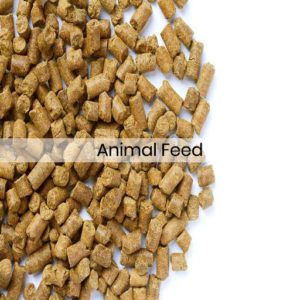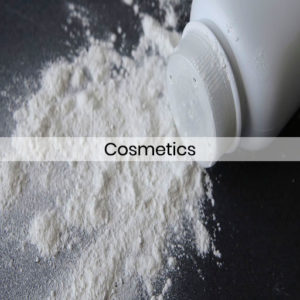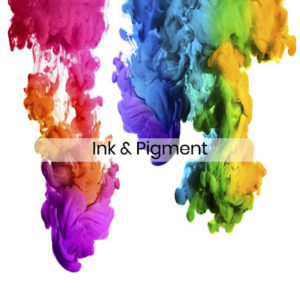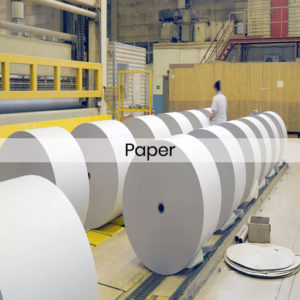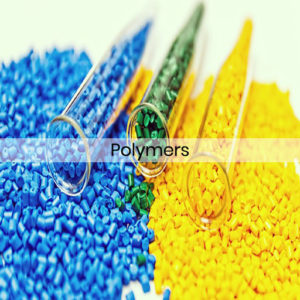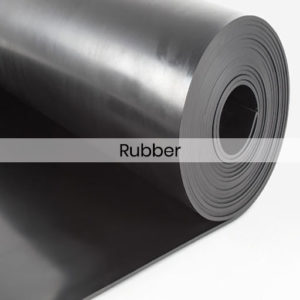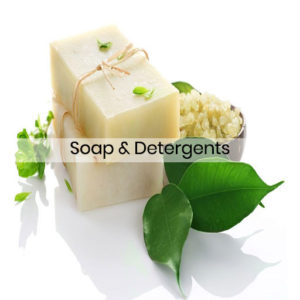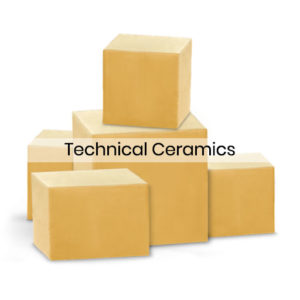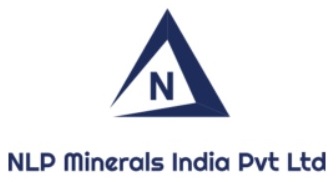Talc
NLP Group is one of the leading Miners and manufacturers of talc in India. We are having our own talc mines in Uttarakhand, Rajasthan & Telangana with combined annual capacity of Approx. 1.50 Lakhs MT. We stand tall among our competitors as we control the entire chain from Mines to Market and maintain the highest level of quality. Our in-house R& D team continuously works on the new product innovation and ensure to produce material as per customer’s requirement.
Our talc is considered to be the best because of its purity (above 99%), Lamellarity and Brightness (up-to 99.5%). Our talc is having “No Asbestos” and is free from any bi-minerals and it is proven in the geological survey of India report.
We made one step ahead recently and have been certified with GMP, HALAL, ROHS and other key certification from Govt. of India and other international certification agencies because of our excellent process control during production.
Unique Feature of NLP Groups’s Talc
- High brightness upt0 99.5%
- High purity upto 99%
- High Lamellarity
- Free from Asbestos and heavy metals and any other bi-minerals
We supply talc in both crude (raw) and powder form.
- We supply talc crude (raw) with brightness from 80%- 99%. The same can be made available in chips form as per customer’s requirement.
- Talc powder can be made available in any brightness from 75%- 99.5% as per customer’s requirement. We can produce talc from 150 Mesh up to 15µ.
Since our inception, we have been focusing on continuous improvement of process starting from mining to processing to packaging and have been succeeding so far.
We have been catering to Pharmaceuticals, Cosmetics, Polymers, Paper, Paint & coating, animal feed, fertilizers, ceramics and many other industries.
Main Application
Talc has been valued for centuries as a body powder. Today it also plays an important role in many cosmetic products, providing the silkiness in blushes, powder compacts and eye shadows, the transparency of foundations and the sheen of beauty creams. In pharmaceuticals, talc is an ideal excipient, used as a glidant, lubricant and diluent. Soap manufacturers also use talc to enhance skin care performance.
Talc Helps:
- Fragrance carrier
- Inert carrier
- Lower formulation cost
- Oil-base replacement
- Optical properties
- Pigment extender
- Softness
Recommended Application::
- Body Perfumery talc Powder
- Cream
- Compact Powder
- Foundation
- Eye Shadow
- Baby Talc
NLP Group produce one of the purest, finest talc for the pharmaceutical and medical industry. It is sterilized by gamma radiation, is free of fibres and has a defined particle size. Our Micro talc 1HN series are very pure lamellar talc with very high brightness, ideally suited for pharmaceutical and medical uses.
Talc Helps:
• As an active and auxiliary agent
• As a carrier for pharmaceuticals with a disinfectant, anti-itching or cooling effect.
• An excipient and helps in neutralize chemical reactions between compounds.
Recommended application:
• Tablet Coating
• Medicated Powders
• Pressed Tablets
• Dental Products
Talc impart a variety of benefits to polypropylene, for instance higher stiffness and improved dimensional stability in automotive parts (under-the hood/bonnet, dashboard, bumper interiors and exterior trim), household appliances and white goods. Advanced milling technology is required to obtain the finest talc without diminishing the reinforcing power of their lamellar structure. Talc is also used for linear low density polyethylene (LLDPE) anti-blocking and as a nucleating agent in semi-crystalline polymers. In polypropylene food packaging applications, talc is a highly effective reinforcing filler.
Talc Helps:
- Antiblocking
- Barrier effect
- Dimensional stability
- Electrical insulation – Fire resistance
- Glass fiber replacement
- Light weighting
- Mechanical properties
- Nucleation
- Scratch & mark resistance
Recommended Application::
- Automotive Compounds
- Non Woven
- Colour Masterbatch
- Anti fabulation Masterbath
- Food packaging & film
- PVC Cable, film and pipe applications
- Wood plastic composites
Talc reduce the viscosity of rubber compounds, thereby facilitating the processing of moulded parts. They also improve extrudate qualities, increasing production rates and enhancing UV radiation resistance of exterior parts such as automotive profiles. In sealants and gaskets, they provide good compression resistance, whilst in pharmaceutical stoppers, they create a barrier against liquids. In cables, talcs function as insulators and in tyre manufacture they make excellent processing aids.
Talc Helps:
- Mechanical properties
- Partitioning agent
- Permeability barrier
- Processing aid
- Synergism with carbon black
Recommended Application::
- Rubber threads
- Rubber Sheets, Hoses , Seals
- Fire resistant wire & cable
- Industrial mechanical goods
- Pharmaceutical closures
- Tires
Talc is used in both uncoated and coated rotogravure papers where they enhance printability and reduce surface friction, improving productivity at the paper mill and print house. They also improve mattness and reduce ink scuff in offset papers. Used as pitch control agents, talc “clean” the paper making process by adsorbing any sticky resinous particles in the pulp onto their platy surfaces, thereby preventing the agglomeration and deposit of these stickies on felts and calenders. As opposed to chemical pitch-control products that pollute the process water, talc is removed together with the pulp, enabling the paper maker to operate more easily in closed-circuit. In specialiy papers, such as coloured papers or labels, talc helps to improve quality and productivity.
Talc Helps:
- Barrier Property
- Co effecient of friction
- Cost Rdeuction
- Environment
- Printability
Recommended Application::
- Barrier Coatings
- Tissue Paper
- Virgin Pulp – Fresh Fiber
Talc confer a whole range of benefits to paints & coatings. In interior and exterior decorative paints, it act as an extender to improve hiding power and titanium dioxide efficiency. Talc’s lamellar platelets make paint easier to apply and improve cracking resistance and sagging. They also enhance matting. In anti-corrosion primers, talc is used to improve corrosion resistance and paint adhesion. They also bring benefits to inks, jointing compounds, putties and adhesives. Our Talc enhances the performance of inks and makes for an ideal filler and extender in water-borne and solvent-borne inks.
Talc Helps:
- Corrosion resistance & barrier properties
- Hiding & TiO2 extender
- Flatting – Matting
- Mud cracking
- Rheology
- VOC reduction
- Weather scrub color UV resistance
Recommended Application::
- Architectural & Decorative paints
- Industrial paints
- Wood coatings
- Color concentrates
- Metal paints
- Organic paints
- Gel coats.
- Floor mortars
- Polyester Putty
Talc is a phyllosilicate which imparts a wide range of functions to floor and wall tiles, sanitary-ware, tableware, refractories and technical ceramics. In traditional building ceramics (tiles and sanitary-ware), it is used essentially as a flux, enabling firing temperatures and cycles to be reduced. In refractory applications, chlorite-rich talcs are transformed into cordierite to improve thermal shock resistance. For steatite ceramics, microcrystalline talcs are the most appropriate. During firing, talc is transformed into enstatite, which possesses electroinsulating properties, while very low-iron-content talcs are particularly suitable for use in frit, engobe and glaze compositions.
Talc Helps:
- Fluxing agent
- Frit, glaze & engobe properties
- Glaze-body fit
- Mechanical properties
- Thermal shock resistance
Recommended Application::
- Automotive cordierite ceramics
- Cordierite – mullite refractories
- Electroceramics
- Frits, glazes & engobes
- Glazed floor tiles
- Large format & thin tiles
- Porcellanato stoneware tiles
- Sanitaryware
- Tableware
- White body earthenware tiles
Talc is an effective anti-caking agent, dispersing agent and die lubricant and therefore contributes to more efficient functioning of animal feed and fertilizer plants. In premixes and agricultural chemicals, talc makes an ideal inert carrier. Talc is also used as an anti-stick coating agent in a number of popular food products and processes including chewing gum,boiled sweets,cured meats,and for rice polishing. In olive oil production, it increases yield and improves the clarity of the oil. Talc acts as fillers and anticaking agents to improve flow and dispersion of animal feeds. Talc’s properties like dust reduction, die lubricant, dispersing agent, flow agent and chemically inert makes it ideal additives and fillers for animal feed.
Talc Helps:
- Anticaking agent
- Die lubricant
- Dispersing agent
- Dust reduction
- Flowability
- Inert carrier
- Processing aid (olive oil)
Recommended Application::
- Fertilizer
- Fruit production
- Olive oil production
- Seed coatings
Product Application

